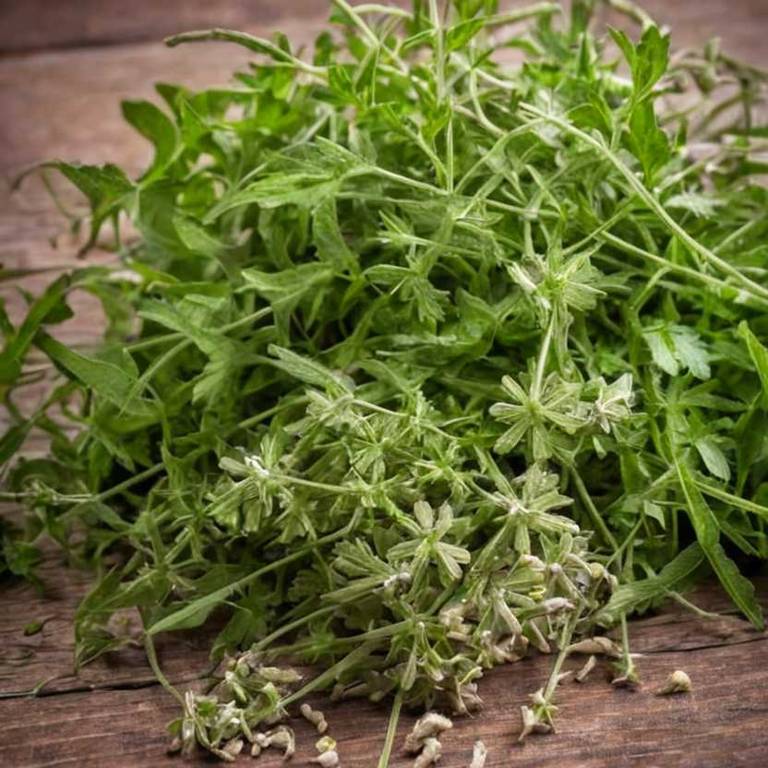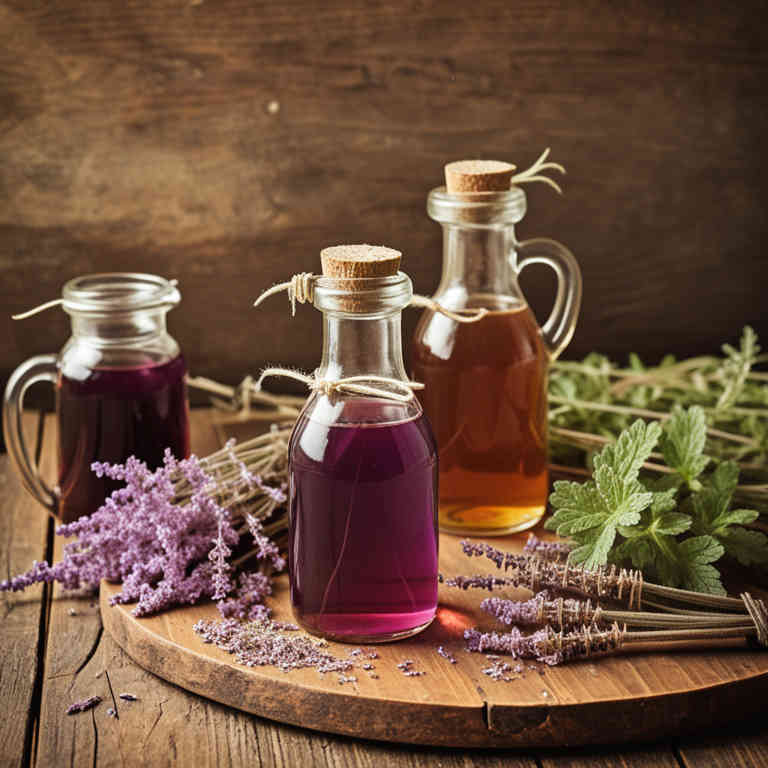10 Best Verbena Officinalis Preparations

The best medicinal preparations of Verbena officinalis are teas, decoctions, tinctures, oils, and creams, each offering unique benefits for health and wellness.
Teas made from dried verbena leaves are commonly used to promote relaxation and ease digestive discomfort.
Decoctions involve simmering the roots or stems to extract more potent compounds, often used for respiratory or skin conditions.
Tinctures provide a concentrated form of the herb, ideal for addressing anxiety or inflammation.
Oils and creams infused with verbena are applied topically to soothe skin irritations and reduce inflammation.
Below there's a list of the 10 best herbal preparations of verbena officinalis for medicinal purposes.
- 1. Teas
- 2. Decoctions
- 3. Tinctures
- 4. Oils
- 5. Creams
- 6. Syrups
- 7. Mucillages
- 8. Capsules
- 9. Lozenges
- 10. Oinments
1. Teas
Verbena officinalis teas is commonly used to treat digestive issues, respiratory infections, and mild skin irritations.
It is often consumed as a herbal remedy for indigestion, bloating, and nausea due to its soothing effects on the gastrointestinal tract. The tea is also used to alleviate symptoms of colds and coughs, as it possesses mild antiseptic and expectorant properties. Additionally, it has been traditionally applied topically to reduce inflammation and promote healing of minor wounds.
The bioactive constituents responsible for these medicinal effects include flavonoids, tannins, and essential oils, which exhibit antimicrobial, anti-inflammatory, and antioxidant activities.

2. Decoctions
Verbena officinalis decoctions is commonly used to treat a variety of ailments, including digestive issues, respiratory infections, and skin conditions.
This herbal preparation is often employed to alleviate symptoms such as indigestion, nausea, and inflammation. It is also used in traditional medicine to support the immune system and reduce fever. The bioactive constituents responsible for its medicinal properties include flavonoids, tannins, and essential oils, which possess antimicrobial, anti-inflammatory, and astringent effects.
These compounds contribute to its effectiveness in addressing various health concerns.

3. Tinctures
Verbena officinalis tinctures is commonly used to treat respiratory and digestive ailments, as well as to promote emotional balance and reduce anxiety.
They are often employed for conditions such as coughs, bronchitis, indigestion, and nervousness. The bioactive constituents responsible for these effects include flavonoids, iridoids, tannins, and essential oils, which possess anti-inflammatory, antispasmodic, and calming properties. These compounds contribute to the plant's ability to soothe the respiratory tract, aid digestion, and support mental well-being.
Due to their versatile therapeutic effects, verbena officinalis tinctures are valued in both traditional and complementary medicine practices.

4. Oils
Verbena officinalis oils is commonly used to treat respiratory and digestive ailments, as well as skin conditions.
The oil is often applied topically for its anti-inflammatory and antiseptic properties, and it may also be ingested in small amounts to alleviate symptoms of indigestion and nausea. Common medicinal uses include treating coughs, bronchitis, and skin infections such as eczema and acne. It is also used to relieve muscle pain and promote wound healing.
The bioactive constituents responsible for these effects include flavonoids, tannins, and essential oils such as verbascoside and luteolin, which possess antioxidant, antimicrobial, and anti-inflammatory properties.

5. Creams
Verbena officinalis creams is commonly used to treat skin conditions and inflammatory disorders.
These creams are often applied topically to alleviate symptoms of eczema, psoriasis, and minor skin irritations. The anti-inflammatory and antimicrobial properties of verbena officinalis make it effective in soothing and healing damaged skin. The bioactive constituents include flavonoids, tannins, and essential oils, which contribute to its therapeutic effects.
These compounds help reduce inflammation, fight bacterial infections, and promote skin regeneration.

6. Syrups
Verbena officinalis syrups is commonly used to treat respiratory conditions such as coughs, bronchitis, and sore throats due to its expectorant and antiseptic properties.
This herbal preparation is also used to alleviate symptoms of digestive disorders, including bloating and indigestion, thanks to its carminative effects. Additionally, it is sometimes employed to reduce fever and relieve inflammation. The most common medicinal uses of Verbena officinalis syrups include treating respiratory infections, digestive issues, and mild fevers.
The bioactive constituents responsible for these effects include flavonoids, tannins, mucilage, and essential oils, which contribute to its anti-inflammatory, antimicrobial, and soothing properties.

7. Mucillages
Verbena officinalis mucillages is commonly used to treat digestive disorders, inflammation, and respiratory conditions.
The mucilaginous properties of the preparation help soothe irritation in the gastrointestinal tract and reduce coughing by coating the throat. It is often used for ailments such as gastritis, ulcers, and bronchitis due to its demulcent and anti-inflammatory effects. The bioactive constituents include polysaccharides, flavonoids, and tannins, which contribute to its healing and protective properties.
These components work together to provide relief and support the body's natural healing processes.

8. Capsules
Verbena officinalis capsules is commonly used to treat digestive issues, anxiety, and skin conditions.
They are often prescribed for ailments such as indigestion, bloating, and nervousness due to their calming and digestive properties. The most common medicinal uses include alleviating gastrointestinal discomfort and promoting relaxation. The bioactive constituents responsible for these effects include flavonoids, tannins, and volatile oils, which have anti-inflammatory, antispasmodic, and sedative properties.
These compounds work together to support digestive health and reduce stress-related symptoms.

9. Lozenges
Verbena officinalis lozenges is commonly used to alleviate symptoms of respiratory tract infections, sore throat, and cough.
These lozenges are often employed to treat ailments such as colds, bronchitis, and laryngitis due to their soothing and antimicrobial properties. The bioactive constituents responsible for these effects include flavonoids, tannins, and essential oils, which possess anti-inflammatory, antiseptic, and expectorant qualities. Additionally, verbena officinalis contains rosmarinic acid, which contributes to its ability to reduce inflammation and combat microbial infections.
These properties make verbena officinalis lozenges a popular choice in herbal medicine for respiratory support.

10. Oinments
Verbena officinalis oinments is commonly used to treat skin conditions, inflammation, and minor wounds due to its antiseptic and anti-inflammatory properties.
These oinments are often applied topically to alleviate symptoms of eczema, psoriasis, and fungal infections. The most common medicinal uses include soothing irritated skin, reducing inflammation, and promoting healing of minor cuts and abrasions. The bioactive constituents responsible for these effects include flavonoids, tannins, and essential oils, which exhibit antimicrobial, astringent, and analgesic activities.
These compounds work synergistically to provide the therapeutic benefits associated with Verbena officinalis oinments.
